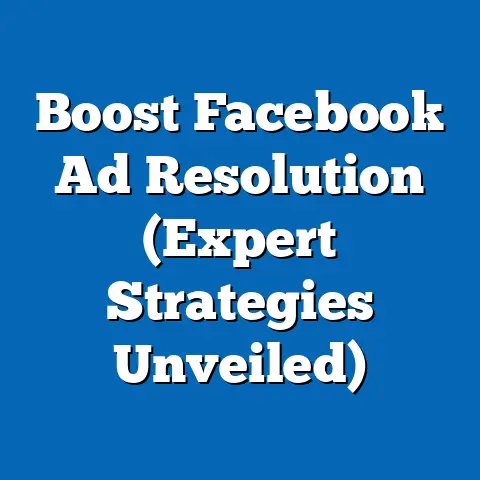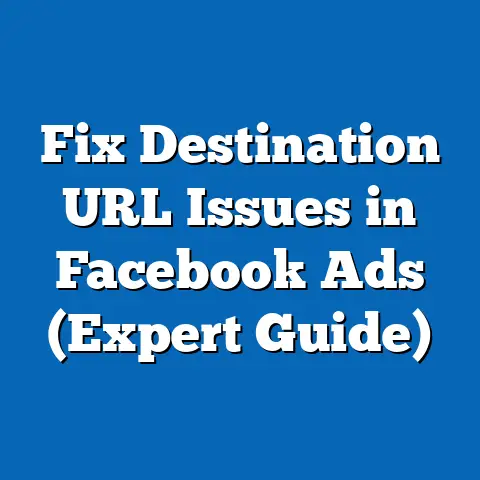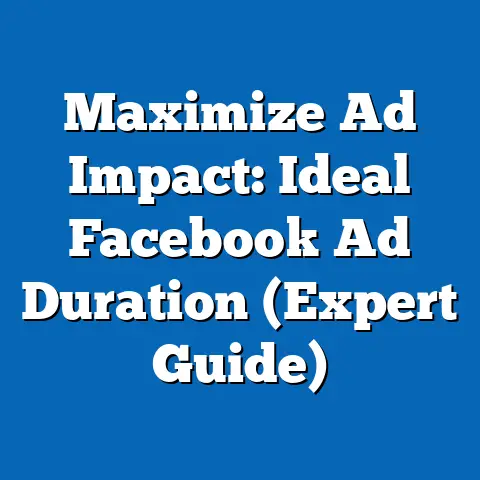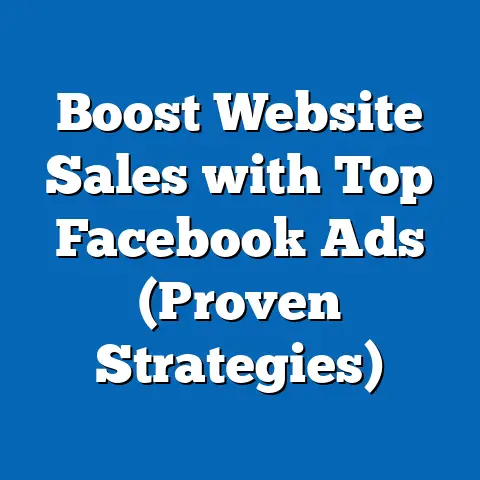Facebook Business Suite vs. Ads Manager (Unlock Performance Secrets)
In the rapidly evolving landscape of digital marketing, tools like Facebook Business Suite and Ads Manager have become indispensable for businesses aiming to maximize their online presence.
Both platforms, developed by Meta, serve as critical resources for managing advertising campaigns, engaging with audiences, and analyzing performance metrics on Facebook and Instagram.
However, as Meta continues to upgrade these tools, understanding their evolution, key features, and societal implications is essential for marketers seeking to unlock their full potential.
Evolution and Upgrades of Facebook Business Suite and Ads Manager
Historical Context and Development
Facebook Ads Manager was introduced in 2011 as a centralized platform for creating, managing, and tracking ad campaigns on Facebook.
At the time, social media advertising was still in its infancy, and businesses were just beginning to recognize the potential of targeted ads based on user demographics and behaviors.
Ads Manager quickly became a cornerstone tool for advertisers, offering detailed analytics and robust targeting options that set a new standard for digital marketing.
In contrast, Facebook Business Suite, launched in September 2020, emerged as a response to the growing complexity of managing multiple social media accounts and advertising needs.
Initially rolled out as a unified platform to streamline operations for small and medium-sized businesses (SMBs), Business Suite integrates functionalities for managing content, messaging, and insights across Facebook and Instagram.
Its introduction marked a shift toward simplifying workflows for business owners who lacked the resources for dedicated marketing teams.
Key Upgrades Over Time
Over the years, Ads Manager has undergone significant upgrades to keep pace with the dynamic digital advertising ecosystem.
Features like dynamic ads, advanced attribution models, and machine learning-driven optimization (e.g., Automated Ads) have enhanced its capabilities, allowing advertisers to fine-tune campaigns with precision.
These upgrades reflect Meta’s focus on leveraging artificial intelligence (AI) to improve ad performance and user experience.
Societal Implications of Upgrades
The upgrades to both platforms have far-reaching implications for society, particularly in how businesses connect with consumers in an increasingly digital world.
Ads Manager’s advancements in targeting and personalization have transformed advertising into a highly individualized experience, raising important questions about data privacy and consumer trust.
High-profile events like the 2018 Cambridge Analytica scandal underscored the societal risks of unchecked data usage, prompting Meta to introduce stricter privacy controls and transparency features in Ads Manager.
Meanwhile, Business Suite’s focus on accessibility has democratized digital marketing for SMBs, enabling entrepreneurs in underserved regions to compete on a global scale.
This shift aligns with broader societal trends toward digital inclusion and economic empowerment, particularly during the COVID-19 pandemic when many businesses pivoted online.
However, the learning curve associated with these tools can still exclude less tech-savvy users, highlighting the need for ongoing education and support.
Defining Characteristics of Facebook Business Suite and Ads Manager
Facebook Business Suite: A Unified Management Hub
Business Suite is designed as an all-in-one platform for managing a business’s presence across Meta’s ecosystem, including Facebook and Instagram.
Its core strength lies in its ability to consolidate tasks such as content creation, scheduling, audience engagement, and basic performance tracking into a single interface.
This makes it particularly appealing to SMBs or solopreneurs who need a straightforward solution without navigating multiple tools.
Key features include cross-platform posting, a unified inbox for messaging across Facebook and Instagram, and simplified insights for tracking engagement metrics.
Unlike Ads Manager, Business Suite prioritizes ease of use over granular control, offering a more holistic view of a business’s social media activities.
However, its advertising capabilities remain limited compared to Ads Manager, often requiring users to switch platforms for complex campaigns.
Facebook Ads Manager: Precision and Power for Advertising
Ads Manager, on the other hand, is a specialized tool tailored for advertisers who require in-depth control over their campaigns.
It offers advanced features for creating ads, defining audience segments, setting budgets, and optimizing performance based on real-time data.
From A/B testing to detailed attribution reporting, Ads Manager is built for marketers who prioritize precision and scalability.
A standout characteristic of Ads Manager is its integration with Meta’s broader advertising ecosystem, including tools like Audience Network and custom audience creation.
This allows for highly targeted campaigns that leverage first-party data, lookalike audiences, and retargeting strategies.
While powerful, its complexity can be overwhelming for beginners, often necessitating training or external expertise.
Contrasting Philosophies and User Focus
The primary distinction between the two platforms lies in their intended audiences and philosophies.
Business Suite caters to users seeking simplicity and efficiency in managing day-to-day social media tasks, while Ads Manager targets experienced advertisers focused on maximizing return on investment (ROI) through detailed campaign management.
This dichotomy reflects Meta’s recognition of the diverse needs within its user base, from small business owners to enterprise-level marketers.
Comparative Analysis: Functionality and Performance
User Interface and Accessibility
Business Suite’s interface is designed with accessibility in mind, featuring a clean, intuitive layout that minimizes the learning curve.
Users can easily navigate between tabs for content, messages, and insights, making it ideal for quick tasks like responding to customer inquiries or scheduling posts.
However, some users have reported limitations in customization and occasional glitches during cross-platform syncing.
Ads Manager, by contrast, has a steeper learning curve due to its comprehensive feature set.
Its dashboard is packed with options for campaign objectives, ad formats, and performance metrics, which can feel cluttered to new users.
Despite this, Meta has made efforts to improve usability through guided workflows and tutorials, though the platform remains best suited for those with prior advertising experience.
Campaign Management and Optimization
When it comes to campaign management, Ads Manager is the clear winner in terms of depth and flexibility.
It allows users to set specific objectives (e.g., brand awareness, conversions, lead generation), choose from a wide array of ad placements, and optimize delivery using AI-driven algorithms.
Features like Campaign Budget Optimization (CBO) enable advertisers to allocate budgets dynamically across ad sets for maximum impact.
Business Suite, while offering basic ad creation and boosting options, lacks the advanced optimization tools found in Ads Manager.
Its ad functionality is more of a complementary feature rather than a core focus, often directing users to Ads Manager for detailed campaign adjustments.
For businesses running simple promotions, this may suffice, but larger campaigns require the robustness of Ads Manager.
Analytics and Reporting
Analytics is another area where Ads Manager outshines Business Suite.
It provides granular data on ad performance, including metrics like cost-per-click (CPC), conversion rates, and return on ad spend (ROAS).
Customizable reports and integration with third-party analytics tools further enhance its value for data-driven decision-making.
Business Suite offers basic insights into post engagement, audience growth, and reach, presented in a user-friendly format.
While sufficient for tracking general trends, it falls short for advertisers needing detailed attribution or cross-channel analysis.
This limitation often necessitates the use of both platforms in tandem for a complete picture of performance.
Integration and Ecosystem Compatibility
Both platforms integrate seamlessly within Meta’s ecosystem, but their scope differs.
Business Suite connects with tools like Shops and Commerce Manager, supporting e-commerce businesses in managing product listings and customer interactions.
Its focus on cross-platform consistency (Facebook and Instagram) aligns with Meta’s vision of a unified business experience.
Ads Manager, meanwhile, integrates with a broader range of advertising tools, including Pixel for tracking conversions and Audience Insights for demographic analysis.
Its compatibility with external platforms like Google Analytics (via tracking tags) makes it a more versatile choice for complex marketing strategies.
However, this also adds layers of complexity that may not be necessary for all users.
Technological and Economic Factors Influencing Platform Use
Technological Advancements Driving Performance
The rapid pace of technological innovation has significantly shaped both platforms.
Ads Manager’s reliance on AI and machine learning for ad optimization reflects broader trends in digital advertising, where automation is key to scaling campaigns.
Features like Advantage+ Placements, introduced in 2022, use AI to automatically determine the best ad placements, reducing manual effort while improving outcomes.
Business Suite benefits from technological advancements in mobile app development and cloud-based syncing, ensuring users can manage their accounts on the go.
However, its reliance on Meta’s infrastructure means that updates or outages (e.g., the 2021 global Meta outage) can disrupt operations, highlighting the importance of redundancy in digital tools.
Economic Considerations for Businesses
Economically, both platforms cater to different budget levels and business scales.
Business Suite is often seen as a cost-effective solution for SMBs, as it consolidates multiple functions without additional fees beyond ad spend.
This aligns with the economic realities of small businesses, which often operate on tight budgets and limited staff.
Ads Manager, while free to use, requires a higher investment in terms of time, expertise, and ad spend to achieve optimal results.
For larger businesses or agencies, this cost is justified by the potential for higher ROI through precise targeting and optimization.
However, economic downturns or shifts in advertising budgets (e.g., post-COVID recovery periods) can influence how businesses prioritize between the two tools.
Societal and Cultural Impacts
Shaping Business-Consumer Relationships
Both platforms have redefined how businesses interact with consumers in the digital age.
Ads Manager’s hyper-targeted advertising capabilities enable brands to deliver personalized content, fostering deeper connections but also raising ethical concerns about manipulation and privacy.
Cultural shifts toward data consciousness, driven by regulations like GDPR and CCPA, have forced Meta to adapt its tools to prioritize transparency.
Business Suite, by focusing on engagement and messaging, supports a more conversational approach to marketing.
This aligns with cultural trends favoring authenticity and direct communication, particularly among younger demographics like Gen Z, who value brand interactions over traditional advertising.
However, the platform’s effectiveness depends on a business’s ability to maintain consistent, meaningful engagement.
Workplace Implications for Marketers
For marketing professionals, the choice between Business Suite and Ads Manager impacts workflow and skill requirements.
Ads Manager often necessitates specialized training or certification (e.g., Meta Blueprint courses), creating a demand for skilled digital advertisers in the job market.
This trend contributes to the professionalization of social media marketing as a career path.
Business Suite, with its user-friendly design, lowers the barrier to entry for non-specialists, allowing business owners or generalists to handle social media tasks.
While this democratizes access, it can also lead to inconsistent campaign quality if users lack strategic understanding.
Organizations must balance the use of both tools to optimize team roles and responsibilities.
Nuances and Diversity in User Experiences
Variability Across Industries and Regions
The effectiveness of Business Suite and Ads Manager varies across industries and geographic regions, reflecting the diversity of Meta’s user base.
For instance, e-commerce businesses benefit more from Business Suite’s integration with Shops, while industries like B2B services may rely on Ads Manager for lead generation campaigns.
Regional differences, such as varying levels of digital literacy or access to high-speed internet, also influence adoption rates.
Individual User Preferences and Needs
Within the same business, different team members may prefer one tool over the other based on their roles and expertise.
A social media manager might favor Business Suite for content planning, while a performance marketer leans on Ads Manager for campaign analysis.
Recognizing these nuances is critical to avoiding a one-size-fits-all approach to tool selection.
Forward-Looking Insights and Uncertainties
Emerging Trends and Potential Developments
Looking ahead, both platforms are likely to evolve in response to emerging trends like the growth of short-form video content (e.g., Reels) and the increasing importance of privacy-first advertising.
Meta’s investments in AI suggest that Ads Manager will continue to prioritize automation and predictive analytics, potentially bridging the gap for less experienced users through guided features.
Business Suite may expand its scope to include more robust ad tools, blurring the lines between the two platforms.
Uncertainties in the Digital Landscape
However, uncertainties remain, particularly regarding regulatory changes and consumer sentiment toward data usage.
The ongoing debate over privacy laws could force Meta to rethink targeting capabilities in Ads Manager, while economic fluctuations might push more businesses toward cost-effective solutions like Business Suite.
Additionally, competition from platforms like TikTok and Google Ads could influence Meta’s strategic priorities, impacting future updates.
Strategic Recommendations for Businesses
To navigate these uncertainties, businesses should adopt a hybrid approach, leveraging Business Suite for day-to-day engagement and Ads Manager for high-stakes campaigns.
Investing in training and staying updated on Meta’s feature releases will also be crucial.
Ultimately, the choice between platforms—or the decision to use both—should align with a business’s specific goals, resources, and audience needs.
Conclusion
Facebook Business Suite and Ads Manager represent two sides of Meta’s vision for digital marketing: accessibility and precision.
While Business Suite empowers SMBs with a unified, user-friendly platform, Ads Manager offers unmatched depth for advertisers seeking to optimize performance.
Their upgrades over time reflect technological advancements, economic realities, and societal shifts, from the rise of AI to growing privacy concerns.
By understanding the defining characteristics, functionalities, and broader implications of these tools, businesses can make informed decisions to unlock their performance secrets.
As the digital landscape continues to evolve, staying adaptable and informed will be key to harnessing the full potential of Meta’s marketing ecosystem.
Though challenges and uncertainties lie ahead, the strategic use of Business Suite and Ads Manager offers a powerful pathway to success in the ever-changing world of social media advertising.






